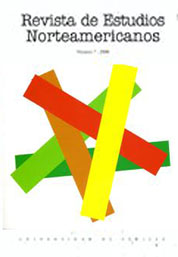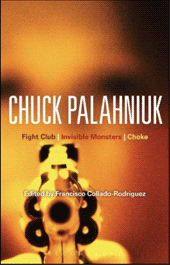Welcome to SAAS
A Contested West: New Readings of Place in the American West (2013), Ed. by M. Simonson, D. Río and A. Ibarrarán

REN: Revista de Estudios Norteamericanos

Chuck Palahniuk: Fight Club, Invisible Monsters, Choke (2013). Ed. by Francisco Collado.

Ana Manzanas & Jesús Benito, Cities, Borders and Spaces in Intercultural American Literature and Film

Call For Papers for Our Next Conference
"A Return to (What Never Was) Normal: Discourses of (Ab)Normalcy in US Culture, Literature, Arts, and Politics; Past, Present, and Futures"
PANEL 12
12) "Challenging the Assumptions of "Normalcy:" Reversal and Defamiliarization in Activist Discourses in the US"
Panel Chair: María Ángeles Toda Iglesia, Universidad de Sevilla
E-mail: mtoda@us.es
On February 25, 2022, Captain Farid Chitav and eleven members of the Russian National Guard refused to participate in the "special military operation" against Ukraine, arguing that they had no passports and that crossing an international border illegally was a criminal offence under Russian law. Whether a legitimate anti-war protest or simply an attempt to escape involvement, the episode is an excellent example of the ways in which it is possible to question the status quo of normalcy by rejecting its naturalized tenets. By applying to a context of war the conventions of law in times of peace, the effect is to highlight implicit assumptions about the normalcy of war.
Similar defamiliarization techniques that force a slowed-down perception of reality (following Shklovsky) to make audiences aware of the injustices and contradictions of normalcy have long been employed in US discourses of activism, protest, and reform. Equally frequent is the use of tropes of reversal to destabilize the binary oppositions characteristic of Western (and other) conceptualizations of reality. Examples include colonial writers' use of the Native American observer as critic of Western mores; slave narrative or Harlem Renaissance depictions of white oppressors through the stereotype of the bestial savage; and feminist and LGTBI+ deconstruction of heteropatriarchal norms of gender and sexuality through paradox, irony, and humor. Anti-war writing and utopian and dystopian fiction also draw abundantly on similar tropes.
This panel calls for papers analyzing such techniques in a variety of contexts and formats, including the visual and performing arts as well as texts, with the aim of understanding how "normalcy" has been defined and challenged along US history.
GUIDELINES FOR PARTICIPANTS
Abstracts of Proposals are to be e-mailed directly to the chair of the selected panel using this form. The deadline for submitting abstracts is October 15, 2022. Panel chairs are expected to accept/reject proposals and have panels set up by November 7.
Non-members of SAAS (of all nationalities) are welcome to participate in the conference, but will be required to pay membership dues for one year as well as the conference registration fee. Members of ASA (American Studies Association), AISNA (Associazione Italiana di Studi Nor-Americani), APEAA (Portuguese Association for Anglo-American Studies) and HELAAS (Hellenic Association for American Studies) need only pay the conference registration fee.
Further guideliness for participants can be found here.







